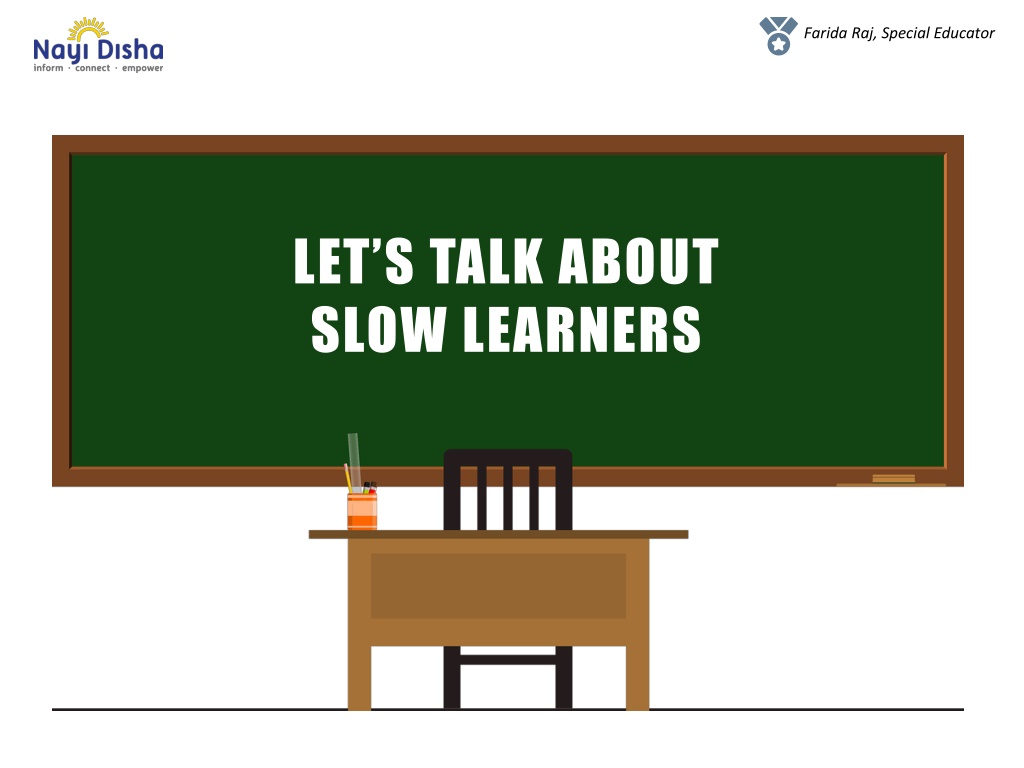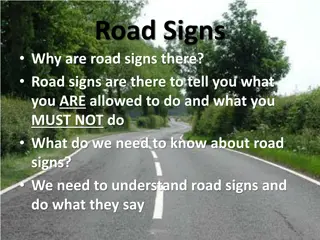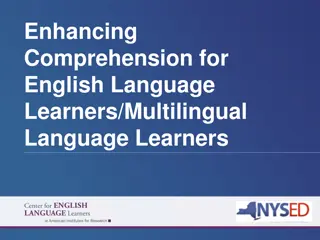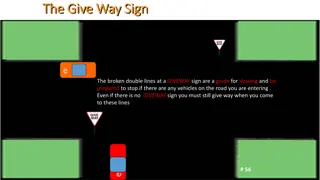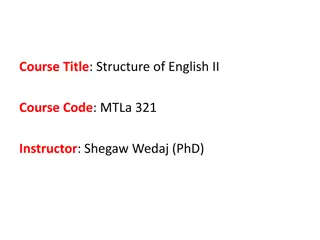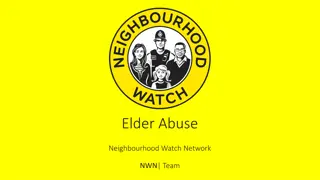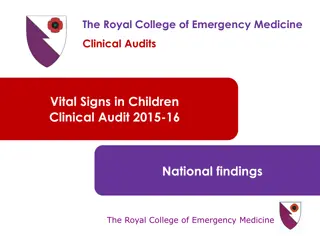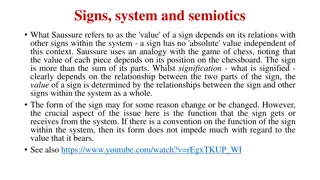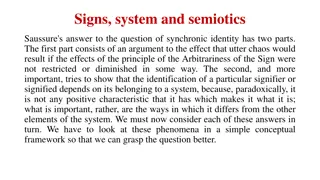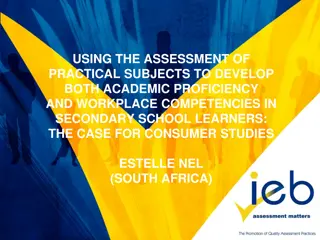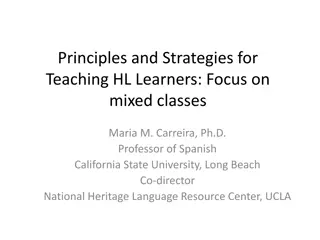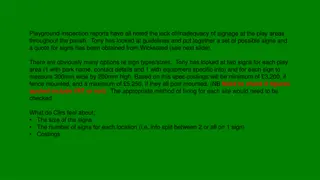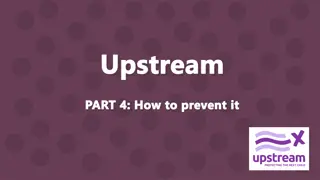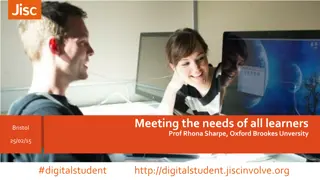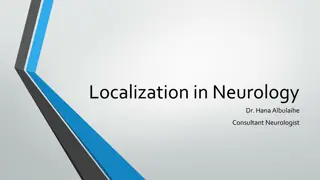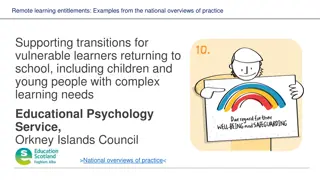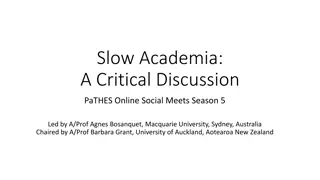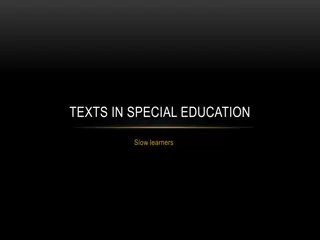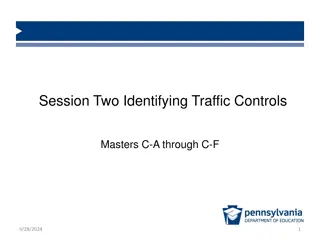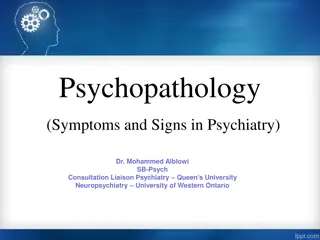Understanding Slow Learners: Characteristics, Signs, and Support Strategies
Learn about slow learners through the perspective of Farida Raj, a special educator. Discover the characteristics and signs of slow learners, such as difficulties in grasping abstract concepts, poor self-image, and slow task completion. Find out how to spot the signs and provide necessary support through positive reinforcement, hands-on activities, and individualized attention. Gain insights into the educational needs of slow learners and the importance of early intervention for their academic growth.
Uploaded on Sep 28, 2024 | 0 Views
Download Presentation

Please find below an Image/Link to download the presentation.
The content on the website is provided AS IS for your information and personal use only. It may not be sold, licensed, or shared on other websites without obtaining consent from the author. Download presentation by click this link. If you encounter any issues during the download, it is possible that the publisher has removed the file from their server.
E N D
Presentation Transcript
Farida Raj, Special Educator LET S TALK ABOUT SLOW LEARNERS
PARENT INFORMATION SERIES Sheetal is an 11-year-old girl whose reading is only as good as a 7- year-old. Her arithmetic is a little better but she is not good at numbers, especially when it comes to practical situations such as shopping and measuring. She is well built for her age and does not look any different from her classmates, except that she is slow in learning new things. She is a bit lazy and her movements uncoordinated. She is not a troublesome child, but homework is too difficult for her. She is always teased by her classmates and clearly not able to benefit from her education. She needs a school environment which is less complicated and is suited to her capacities in all aspects of learning. More importantly, she needs a one-to-one relationship with an understanding teacher. In medical terminology, she is an educationally backward child with borderline intelligence. She is a slow learner. Farida Raj, Special Educator
WHO ARE SLOW LEARNERS? WAY TO SPOT THE SIGNS TIPS FOR PARENTS/TEACHERS Who are slow learners? SLOW LEARNERS are those whose standard of school work falls below that of an average child of their age. A slow learner has learning abilities comparable to children a stage younger than them. Such children need help to attend to their special academic needs and not medical or psychological ones. Some of these children are lucky to get a special educator to help them cope with schoolwork but most struggle for want of special attention and teaching. Early intervention play a crucial role in the academic growth of a slow learner. It is the failure to recognize and provide for their problems that set them back in their schoolwork. Farida Raj, Special Educator
WHO ARE SLOW LEARNERS? WAY TO SPOT THE SIGNS TIPS FOR PARENTS/TEACHERS Way to spot the signs: Characteristics of a slow learner Function according to their ability is significantly below their class level Are prone to immature, interpersonal relationships Have difficulty following multistep directions Live in the present and do not have long-range goals Have trouble with organizational skills & have difficulty transferring & generalizing information). Score consistently low on achievement tests Work well with hands-on material . Since they have difficulty in grasping abstract concepts, they perform at a higher level when information is presented in concrete manner. e.g. in laboratory , manipulative material, hands on activities. Have poor self-image Work on all tasks slowly Master skills slowly; some skills may not be mastered at all. Farida Raj, Special Educator
WHO ARE SLOW LEARNERS? WAY TO SPOT THE SIGNS TIPS FOR PARENTS/TEACHERS TIPS FOR PARENTS/TEACHERS Educational needs of a slow learner Acquire positive attitude towards self, through success & achievement Ability to work in a team with others . Find means of expression through language, art, drama and physical movement Develop thinking & language skills Readiness for educational skills Awareness and knowledge of the environment Farida Raj, Special Educator
WHO ARE SLOW LEARNERS? WAY TO SPOT THE SIGNS TIPS FOR PARENTS/TEACHERS TIPS FOR PARENTS/TEACHERS Slow learners can benefit from remedial education Slow learners are very aware of their difficulties, particularly in reading, spelling, written expression and math. As the child grows older, the effects of the obvious deficits in learning manifest as behavior problems and deteriorating attitudes. The slow learner needs to be taught in ways that adapt to his poor capacity for learning, such as with Remedial Teaching. Farida Raj, Special Educator
WHO ARE SLOW LEARNERS? WAY TO SPOT THE SIGNS TIPS FOR PARENTS/TEACHERS TIPS FOR PARENTS/TEACHERS 5 point agenda for remedial education in a slow learner 1 Child s mental maturity 4 Nature of the work plan 2 Child s mental readiness 5 Teacher-child relationship 3 Structure of the teaching program Farida Raj, Special Educator
WHO ARE SLOW LEARNERS? WAY TO SPOT THE SIGNS TIPS FOR PARENTS/TEACHERS TIPS FOR PARENTS/TEACHERS 5 point agenda for remedial education in a slow learner Child s Mental maturity 1 The child must be mentally matured to discriminate between letters, sounds and word shapes. While planning activities, the teacher should bear in the mind the child s age-appropriateness. e.g. Slow learners aged 5-8 may require activities comparable to those of typical children aged 3-5. Farida Raj, Special Educator
WHO ARE SLOW LEARNERS? WAY TO SPOT THE SIGNS TIPS FOR PARENTS/TEACHERS TIPS FOR PARENTS/TEACHERS 5 point agenda for remedial education in a slow learner Child s Mental readiness 2 Formal teaching of the basic subjects should not be attempted if the child is not psychologically ready. Failing to do so will cause the children to become frustrated bored and will exhibit less confidence. Farida Raj, Special Educator
WHO ARE SLOW LEARNERS? WAY TO SPOT THE SIGNS TIPS FOR PARENTS/TEACHERS TIPS FOR PARENTS/TEACHERS 5 point agenda for remedial education in a slow learner Structure of the teaching program 3 Selection of techniques to suit individual difficulties of the child can help the child learn. Research studies show that slow learners are visually ready for reading than auditory ready. Therefore, it is important that they are taught sight vocabulary of meaningful words at the beginning of reading program and then with phonics which leads to better word recognition. Farida Raj, Special Educator
WHO ARE SLOW LEARNERS? WAY TO SPOT THE SIGNS TIPS FOR PARENTS/TEACHERS TIPS FOR PARENTS/TEACHERS 5 point agenda for remedial education in a slow learner 4 Nature of the work plan Create a distraction free zone where the child can work quietly. Limit working time and have several short work periods rather than a single long one. Add variety to the academic routine. Use games, puzzles and other engaging tools during the learning process. Work on material that is somewhat challenging but allows success. Work that is too hard or too easy may be a turn-off. Farida Raj, Special Educator
WHO ARE SLOW LEARNERS? WAY TO SPOT THE SIGNS TIPS FOR PARENTS/TEACHERS TIPS FOR PARENTS/TEACHERS 5 point agenda for remedial education in a slow learner The parent/ teacher - child relationship 5 A child who has experienced recurrent failure in academics may become aggressive, stubborn and may exhibit hopelessness and apathy. You as a teacher/parent must work to replace these feelings with mutual trust, optimism and enthusiasm to learn. Make a note of the child s weaknesses and plan activities that can help him/her overcome those challenges. Use a lot of praise and reinforcements. Encourage your child to talk to you. Enquire about their day and interests. Farida Raj, Special Educator
WHO ARE SLOW LEARNERS? WAY TO SPOT THE SIGNS TIPS FOR PARENTS/TEACHERS Remember, intellectual development cannot be isolated from - MEMORY ATTENTION CONCENTRATION EMOTIONAL DEVELOPMENT SOCIAL EXPERIENCES Farida Raj, Special Educator
This content has been developed in collaboration with Remedial & Special Educator Ms.Farida Raj. It has been adapted from her book Breaking Through" - A Hand Book for Teachers and Parents of Children with Learning Difficulties & reproduced here with consent. Nayi Disha Resource Centre is an online information resource platform that supports families of persons with, Specific Learning Disabilities, Intellectual & Developmental Disabilities. Join Us on Facebook Join Us on Twitter Visit us at www.nayi-disha.org Join Us on Linkedin
